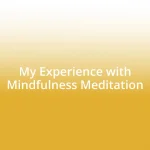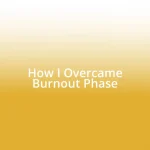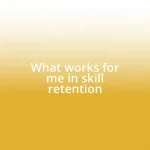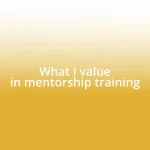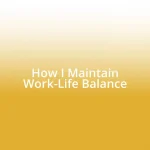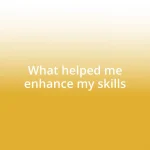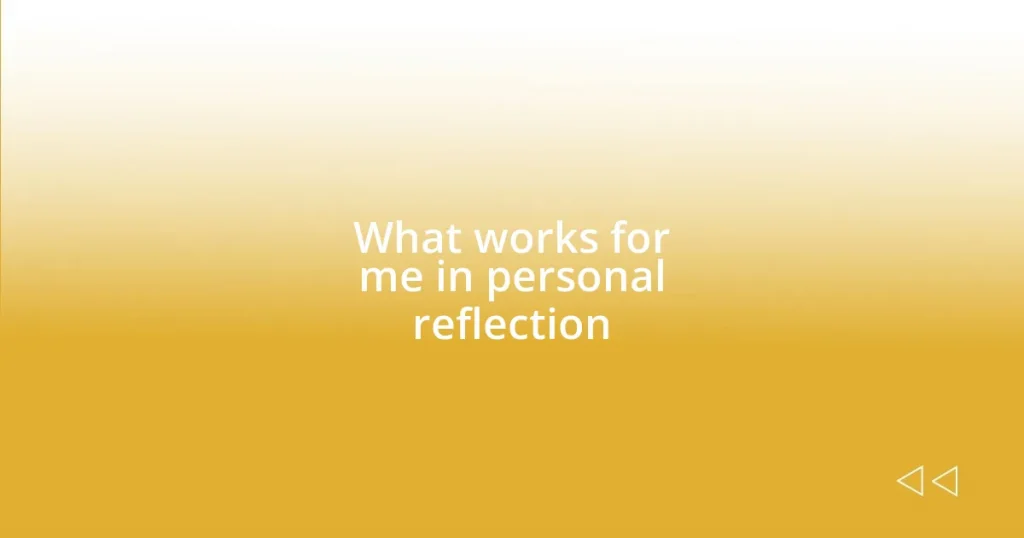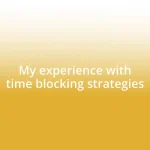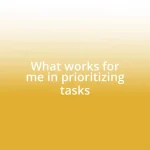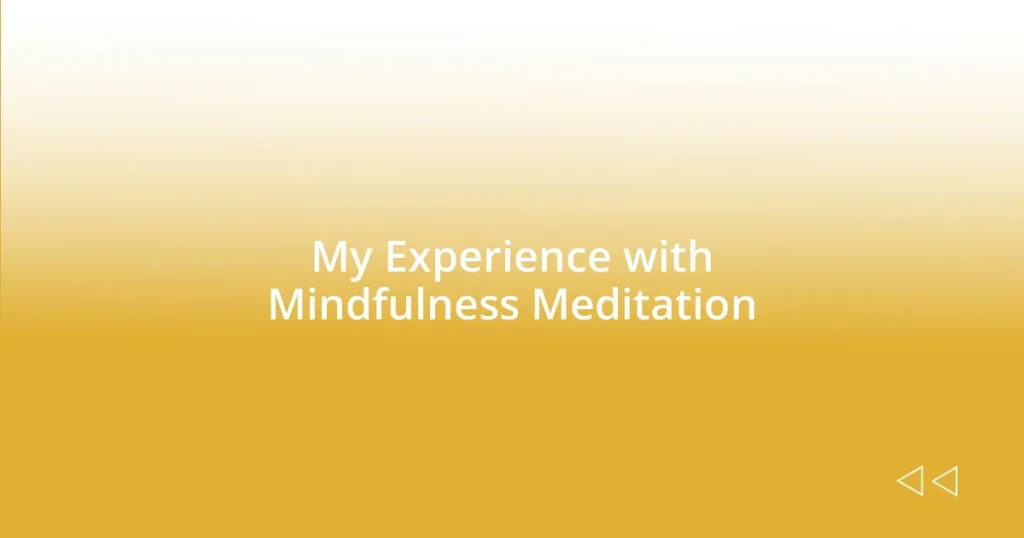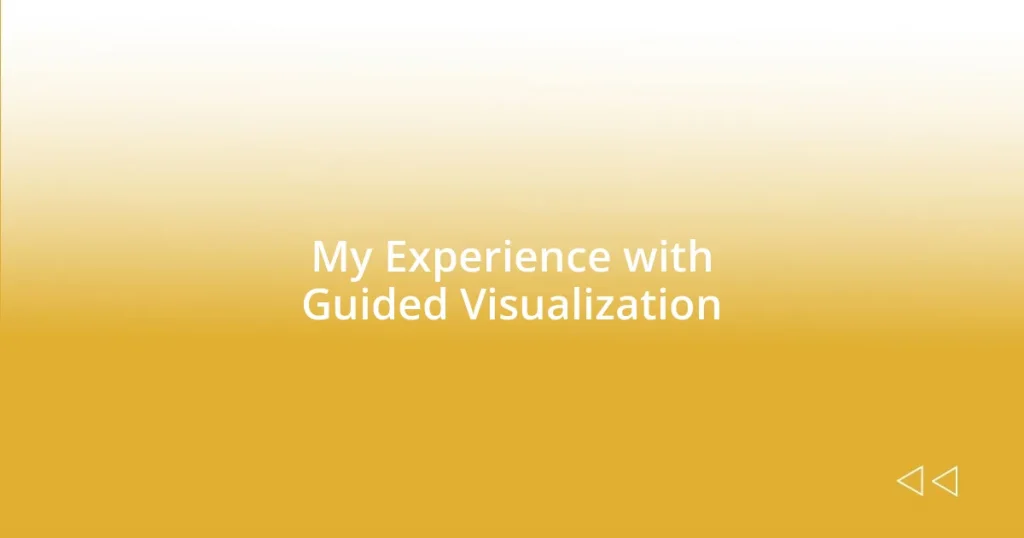Key takeaways:
- Personal reflection fosters enhanced self-awareness, clarity in decision-making, and personal growth through introspection and honesty.
- Effective techniques for reflection include scheduled time for contemplation, guided questions, and the use of visual aids like mind maps.
- Journaling serves as a therapeutic tool that helps clarify thoughts, express emotions, and recognize gratitude, leading to personal insights.
- Evaluating personal growth through reflection allows individuals to recognize patterns, improve communication, and embrace change as part of their development journey.
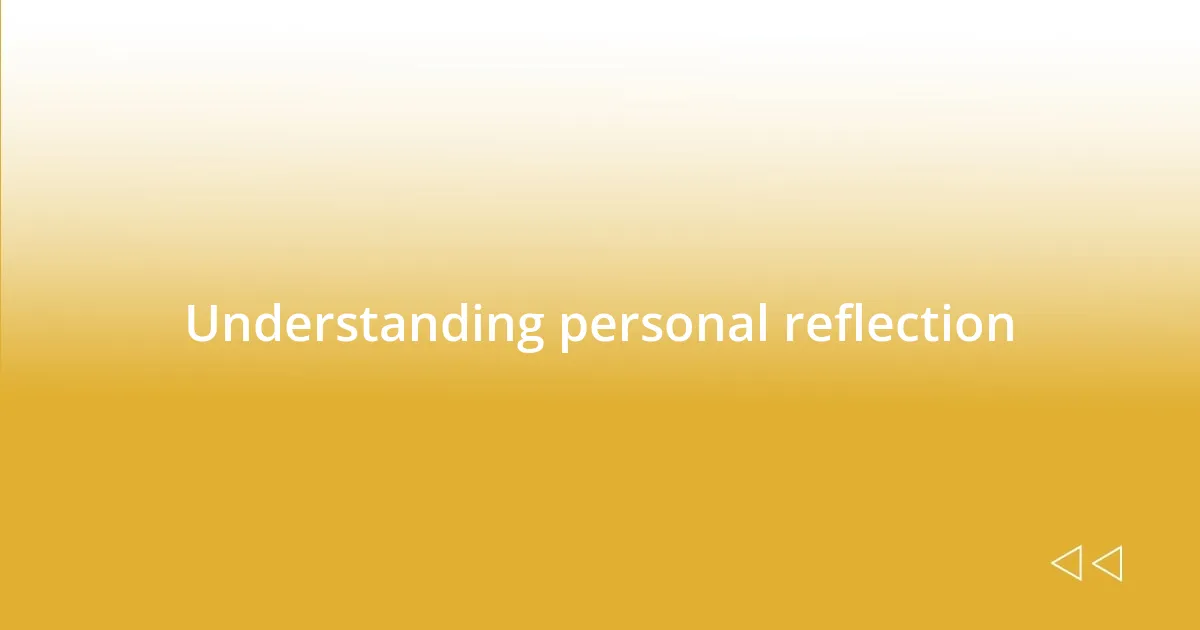
Understanding personal reflection
Personal reflection is like shining a flashlight into the corners of our minds, illuminating thoughts and feelings that we might otherwise overlook. I remember a time when I felt overwhelmed by life decisions. By simply taking a quiet moment to reflect, I discovered my true desires, which paved the way for clarity and direction. Just think about it: when was the last time you paused to really listen to yourself?
Engaging in personal reflection allows us to gain insights about our patterns and behaviors. I’ve found that jotting down my thoughts at the end of the day reveals recurring themes in my emotional responses. What stands out to you when you glance back at your thoughts? Often, it’s in those quiet moments of introspection that we unlock our potential for growth.
For me, understanding personal reflection is rooted in vulnerability and honesty. I once hesitated to confront my fears, but during one reflective session, I faced them head-on. It was almost liberating. How often do we allow ourselves that freedom to explore our inner landscapes without judgment? Understanding this process has taught me that genuine self-reflection is both a journey and a powerful tool for personal development.
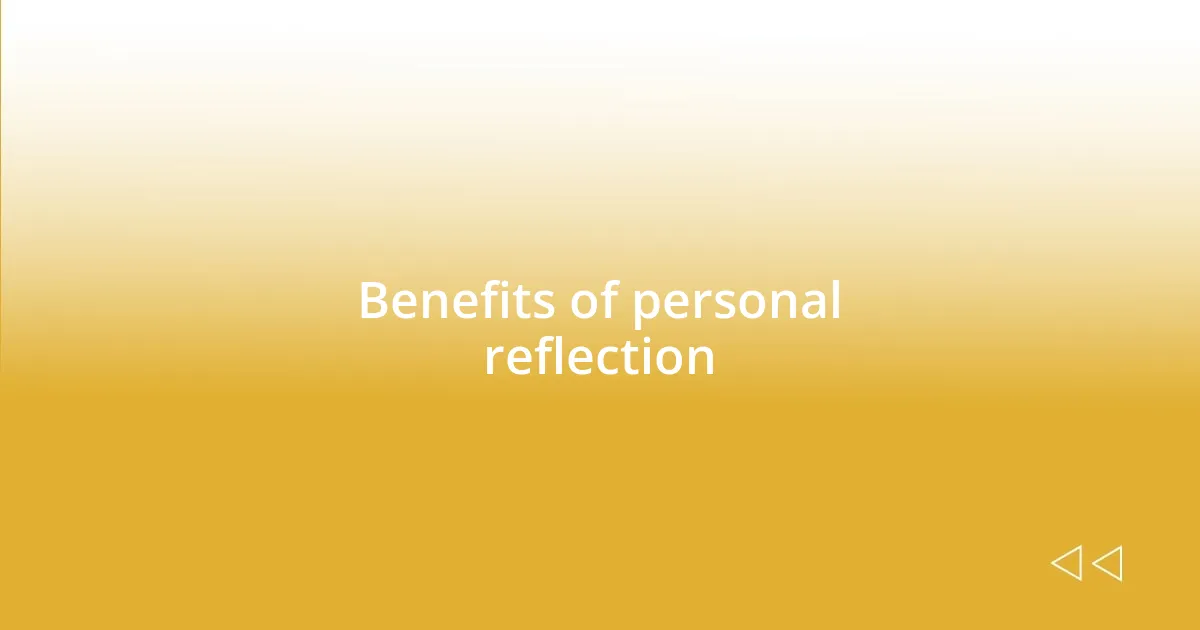
Benefits of personal reflection
The benefits of personal reflection are profound and multifaceted. I’ve noticed that taking the time to assess my day often yields surprising insights. For instance, after a challenging week, I decided to write about my experiences. I realized that my frustration stemmed not from external pressures, but from my own unmet expectations. This understanding helped me reset my goals, making them more achievable and grounded.
- Enhanced Self-Awareness: Regular reflection fosters a deeper understanding of our emotions and motivations.
- Clarity in Decision-Making: Reflecting on past choices guides future decisions with greater wisdom.
- Increased Empathy: By reflecting on our experiences, we often gain insight into the feelings of others, enhancing our relationships.
- Stress Reduction: Taking time to process thoughts can alleviate anxiety and create a sense of calm.
- Personal Growth: Reflection reveals areas for improvement, paving the way for continuous self-improvement.
Another significant benefit is the boost in creativity that often gets unlocked through reflection. I remember diving into journaling during a particularly uninspired stretch in my career. As I poured my thoughts onto the page, ideas began to flow, revealing connections I hadn’t previously seen. It felt like the fog lifted, allowing my creativity to flourish once more. That’s the beauty of introspection—it lays the groundwork for innovation and fresh ideas.
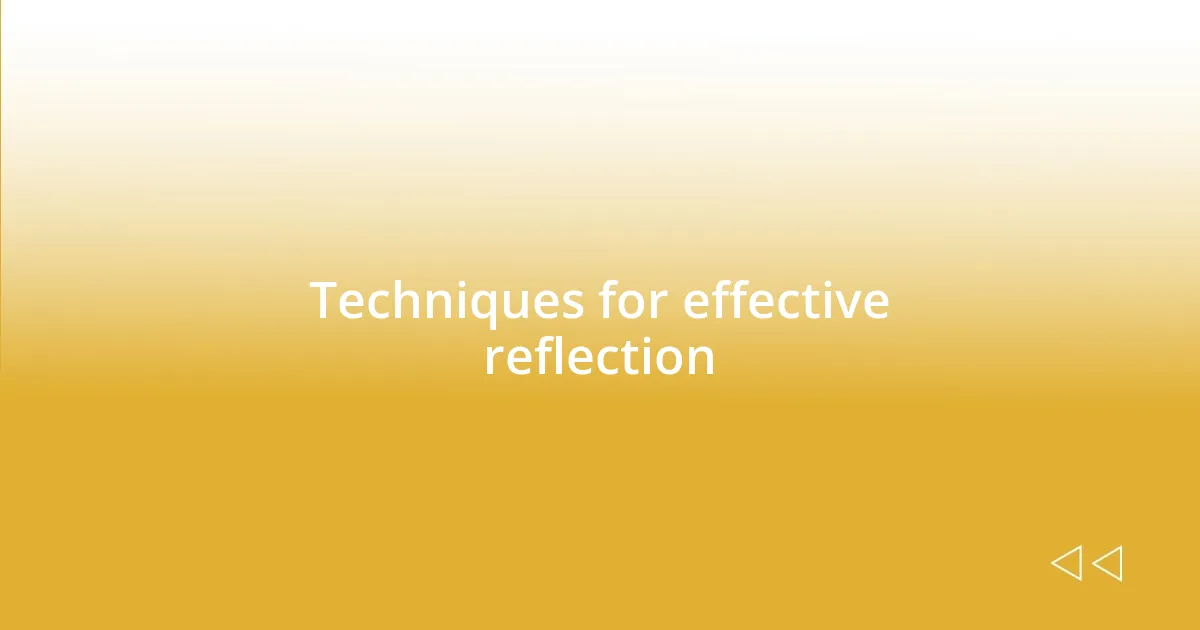
Techniques for effective reflection
Engaging in effective reflection involves using practical techniques that suit your personal style. For me, setting aside a dedicated time each week to analyze my thoughts makes a significant difference. I find that these scheduled moments, often accompanied by a warm cup of tea, create a comforting space. This ritual not only helps me unwind but also encourages a deeper exploration of my feelings.
Another technique is the use of guided questions during reflection. I remember one afternoon when I came across prompts that asked me to identify three things I was grateful for. Surprisingly, this simple exercise opened the door to recognizing the abundance in my life, counteracting feelings of stress. Have you ever tried asking yourself targeted questions? It can lead you to unexpected insights that enrich your understanding of yourself.
Lastly, I’ve found that visual aids can enhance my reflection process. For instance, I often create mind maps to visually organize my thoughts and feelings. This method not only makes the information more accessible but also sparks creativity as I connect different ideas. It’s fascinating how transforming abstract thoughts into a tangible format can illuminate pathways I hadn’t considered before.
| Technique | Description |
|---|---|
| Scheduled Reflection | Designating a specific time for regular reflection creates a routine that encourages introspection. |
| Guided Questions | Using targeted questions, like expressing gratitude, can evoke deeper insights and enhance self-awareness. |
| Visual Aids | Employing tools like mind maps helps clarify thoughts, making patterns more evident and sparking creativity. |
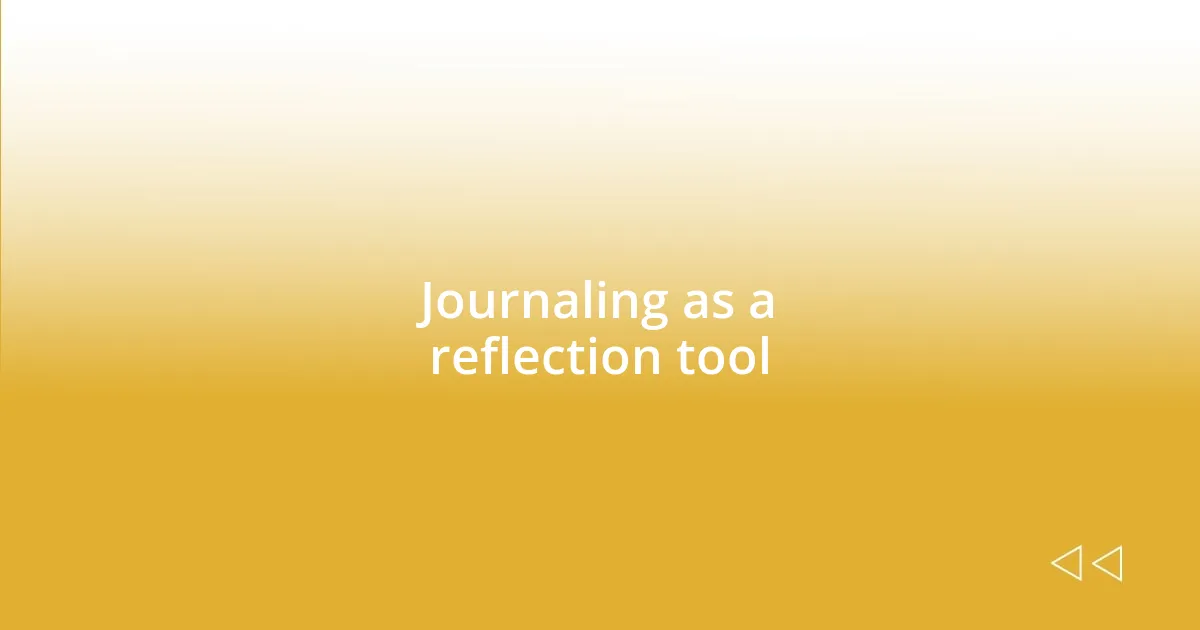
Journaling as a reflection tool
Journaling has been an invaluable tool for my personal reflection journey. There’s something therapeutic about putting pen to paper, transforming chaotic thoughts into a coherent narrative. I vividly recall a time when I felt overwhelmed with decision-making; pouring my feelings into my journal helped clarify my priorities and allowed me to see what truly mattered. Have you ever felt that sense of liberation after unloading your thoughts?
During one particularly tough period, I started a gratitude journal, and it changed my outlook entirely. Each day, I would write down three things I appreciated, no matter how small. This simple act opened my eyes to the little joys I often overlooked. It was a grounding experience that taught me how powerful a shift in focus can be; rather than dwelling on struggles, I found hope in the everyday.
I’ve also experimented with free writing. Whenever I felt stuck in my reflection process, I’d set a timer for ten minutes and write freely without self-editing. This exercise often unearthed emotions I hadn’t acknowledged. It’s amazing how giving yourself permission to express without judgment can lead to profound realizations. Have you tried this method? You might be surprised by where your thoughts take you!
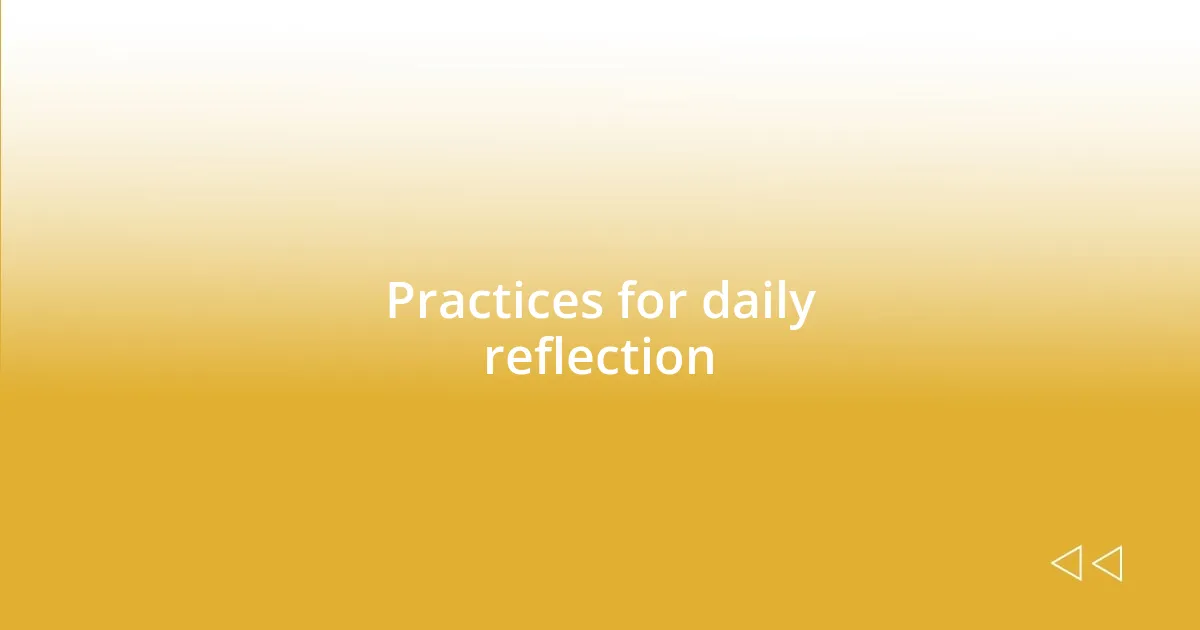
Practices for daily reflection
Reflecting on my day each night has become a cherished ritual for me. I began this practice when I noticed how different I felt after just five minutes of quiet thought before sleep. I use these moments to sift through my emotions, celebrating the highs and confronting the lows. Have you ever tried to tune into your feelings at day’s end? It can be surprisingly enlightening.
I also incorporate mindfulness meditation as a daily tool. Recently, I found myself sitting quietly, focusing on my breath for just a few minutes. This simple act transformed into a powerful reflection session. It wasn’t just about clearing my mind but diving deeper into my feelings and thoughts without judgment. The experience is often so grounding that I come out with more clarity and peace. What if, instead of being pulled in every direction, you paused and directed your attention inward?
Additionally, I find value in incorporating nature into my reflection practice. Whenever I walk through my local park, I take a moment to appreciate my surroundings, reflecting on how they mirror my own emotional landscape. Just last week, as I observed the blooming flowers, I couldn’t help but relate them to my own personal growth. There’s something about being in nature that inspires introspection. Have you ever noticed how a change of scenery can prompt new thoughts? It’s remarkable how external beauty can ignite internal reflection.
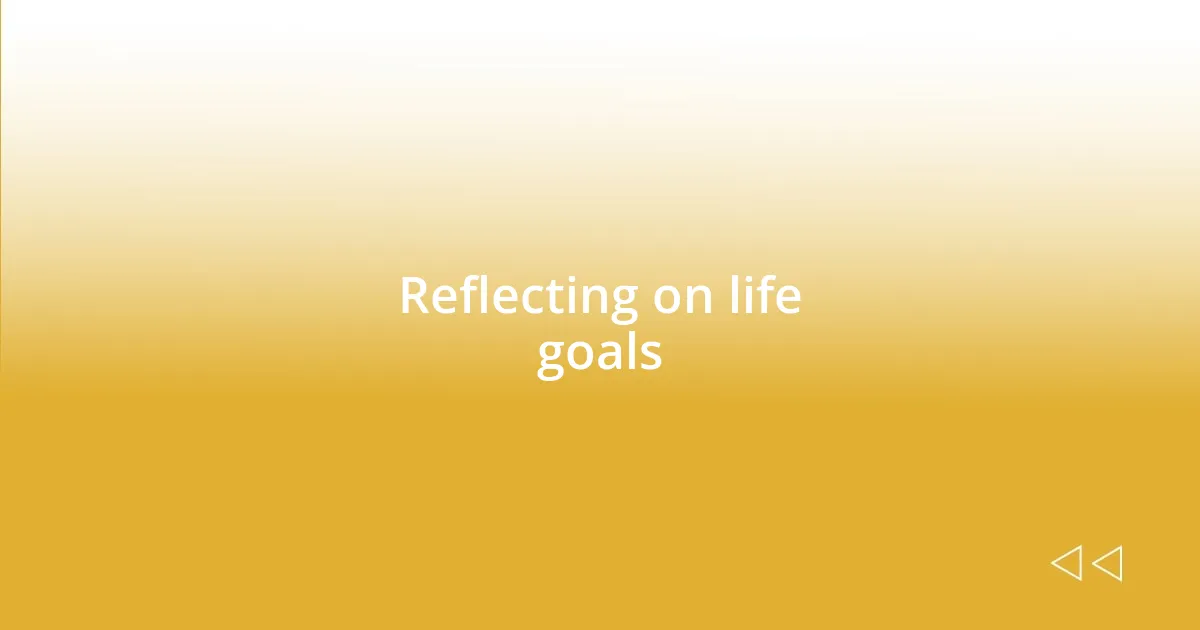
Reflecting on life goals
Reflecting on my life goals has always been a transformative experience for me. I remember a moment after a big career decision, where I took a weekend to review my aspirations. Sitting on my porch with a cup of tea, I found myself jotting down what truly mattered to me—my values, dreams, and even the fears that held me back. It was eye-opening! Have you ever taken a step back to examine what you actually want out of life?
As I delved deeper into my goals, I began to create a vision board. This was no ordinary collage of images; it was a visual representation of my dreams, filled with markers of the life I wanted to live. Each visual reminded me daily to align my actions with my aspirations. It was surprisingly motivating! I still ask myself, how often do we let the everyday grind overshadow our personal ambitions?
One profound realization I had while reflecting on my goals was the importance of setting realistic checkpoints. After grappling with disappointment over unachieved targets, I learned to break my ambitions into smaller, manageable steps. I remember celebrating mini-victories—like finishing a challenging course—that kept the fire alive in me. It’s a reminder that progress is progress, no matter how small. How do you celebrate your steps forward, no matter how tiny?
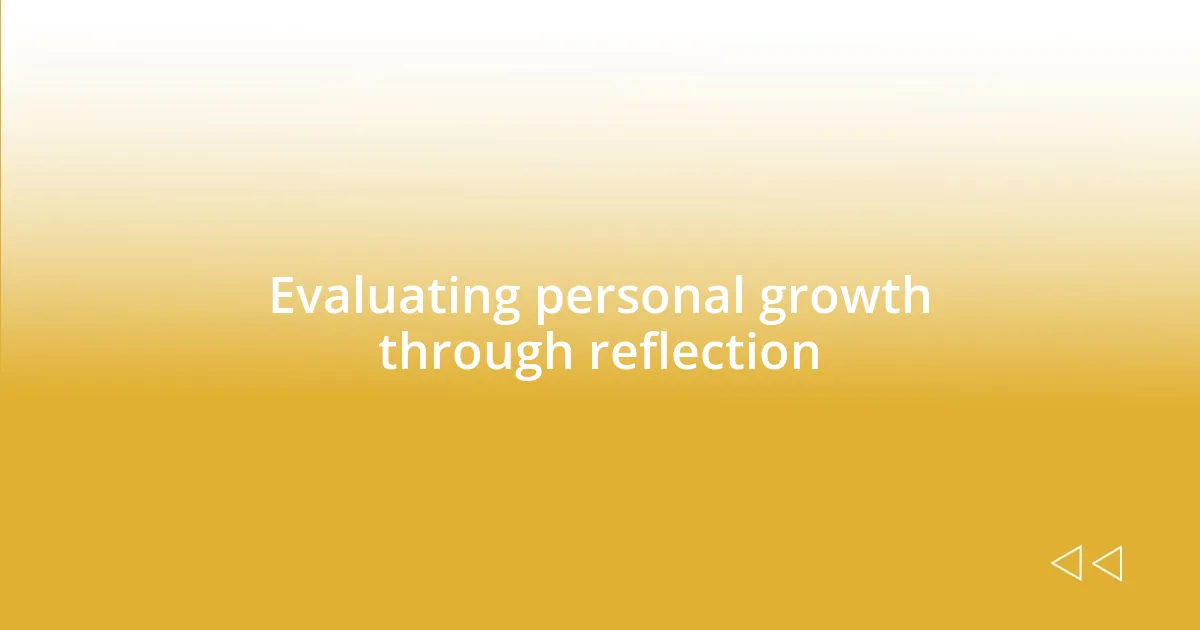
Evaluating personal growth through reflection
Evaluating my personal growth through reflection has often felt like piecing together a mosaic of my experiences. I vividly remember a time when I wrote down my reactions to a challenging situation that arose at work. By revisiting those feelings weeks later, I could clearly see how much I had changed in my perspective and reactions. It struck me—have you ever looked back at a tough moment and realized just how far you’ve come since then?
One of the tools I’ve found particularly useful is journaling, which has transformed into a mirror reflecting my inner self. I often flip through my previous entries, and I’m amazed at the patterns that emerge. For instance, the way I navigated feelings of stress in my early entries is starkly different from how I approach them now. It’s empowering to observe this growth and wonder: what patterns can you uncover about yourself in your own reflections?
Engaging in honest reflection has also helped me identify my areas for improvement. After a recent encounter where I realized I could have communicated better, I took time to reflect on it. I recognized that it wasn’t just about the conversation itself, but about my readiness to embrace change. This moment prompted me to consider—how open are you to exploring your challenges and turning them into opportunities for growth? Each reflection fuels my journey of self-discovery, making it an invaluable exercise.

